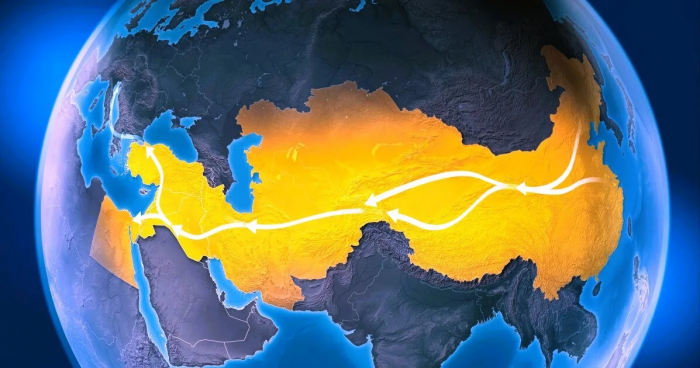The report analyses the traffic in Azerbaijan, Georgia, and Kazakhstan, the three main participating countries in the Middle Corridor, and notes a 33 percent increase in container traffic on the MC in 2022 compared to 2021. If the MC is operationalized, in 2030 trade via the Caspian Sea will account for over 60 percent of trade between the MC countries, up from 40 percent in 2021.
Besides the primary benefits, the report also points out several challenges that currently prevent the full operationalization of the corridor. These include poor operational efficiency of the ports on both the Caspian and Black Seas, bottlenecks with the railways end-to-end infrastructure, delays at border crossing points, not uniformly used or integrated modern information technology solutions by MC stakeholders, lack of an integration system, and time-consuming paperwork procedures. Another important aspect is the development of uniform customs and transportation tariffs.
Eshad Mammadov, Professor of Economics, says in his interview to AzVision.az that the approach on the poor organization, profitability indicators, and economic efficiency of transportation over the Caspian and Black Sea ports is not groundless. He believes the tariffs, especially those by Georgian ports, are too high and not competitive. There is a need to apply flexible tariff mechanisms. Otherwise, the competitiveness of the Middle Corridor might not be able to bear the pressure of the competitive conditions so habitual in the field of transport and logistics.
‘The tariff policy is not currently very efficient. We must apply other mechanisms that would boost dividends for the MC stakeholders and progressively develop commodity circulation and freight transportation. This will ultimately make cargo transportation over both the Caspian and Black Seas more efficient, which is also within the economic interests of these countries. Increasing traffic on these corridors, which will boost economic dividends, requires a flexible tariff policy on the one hand, and stimulating measures on the other.’
- What is the state of the railway structure along the corridor? What must be done to develop the field?
‘We absolutely must take appropriate measures to up efficiency indicators along railway transportation. We are experiencing both technological and traditional problems in the field. There are technological discrepancies in the railway lines of different states.
The differences in financial and investment potential among countries are also making the problems more visible. What we are trying to say is that the countries are all different when it comes to technologies applied, financial-investment and economic potential, and economic policy.
On the other hand, we can eliminate a major portion of these problems through a flexible tariff policy and other stimulating measures, quotas, and concessions. This requires an effective collaboration among the operators on national railways, national regulatory agencies, and ministries to adopt decisions that facilitate an increase in traffic.’
- What are some other problems on the Middle Corridor and what do we need to do to eliminate them?
‘Compared to other corridors the MC has a traffic speed problem, largely due to difficulties at checkpoints and customs infrastructure. The countries have different levels of digitization at these. We must consider both their economic potential and management efficiency. Overall, the traffic speed along the MC will largely depend on how efficiently innovative and digital solutions are applied.
Azerbaijan is currently applying innovative approaches in digitizing customs infrastructure and checkpoints. Other countries must also adopt the practice. If they do not have sufficient economic resources, operational regional investment centres could be a way out, because all the stakeholders are ultimately interested in more efficient traffic along the Corridor. Therefore, we must think of establishing appropriate investment institutions. Steps in this direction could have a significant impact on the overall efficiency of the Corridor.’
- What steps should Azerbaijan, Kazakhstan and Georgia take to make the Middle Corridor fully operational?
‘The MC is crucial in terms of diversifying Azerbaijani, Kazakhstani, and Georgian economies. A closer look into the structure of these national economies reveals diversification challenges. Making the MC fully operational will also positively affect the export opportunities of these countries.
We must also take advantage of transit opportunities, which translate into foreign exchange inflow and some diversification of foreign trade. The Azerbaijani and Kazakhstani economies both have a large resource base to offer. We do not observe any challenges regarding foreign trade. At the same time, diversifying our exports is a priority for Azerbaijan, as the head of the country has numerously stated. Exporting non-oil and finished products is a priority direction for Azerbaijan. Transport-logistics corridors will greatly stimulate the development of our national economy in this direction.
Georgia, with a weak resource base, needs implementing such projects more. Participating in international projects over the last decades has significantly impacted the stability of the Georgian economy. The MC is thus a great support mechanism for Georgia.’
- Does the Middle Corridor have sufficient informational support in terms of promotion?
‘Having an efficient informational promotion is also crucial in terms of furthering the projects we are a stakeholder of. Competitive environment also sharpens the informational challenges. The centres, interested in developing alternative corridors, are spreading critical opinions about other projects. We must be ready for it. Pursuing an appropriate informational policy for the transport and logistics corridors we are stakeholders of can significantly boost our competitiveness in this field.’
AzVision.az
More about:















































